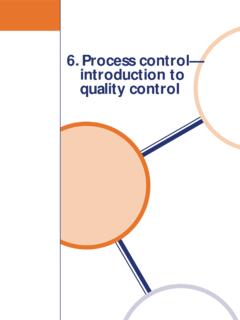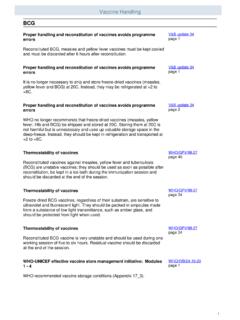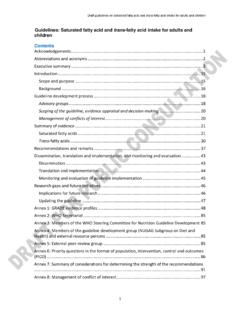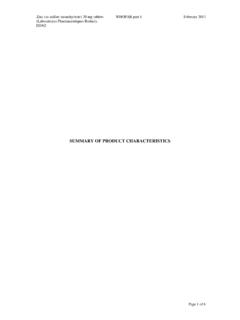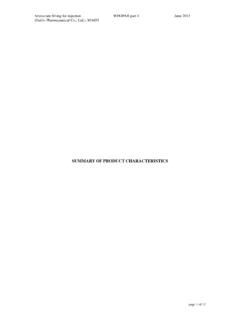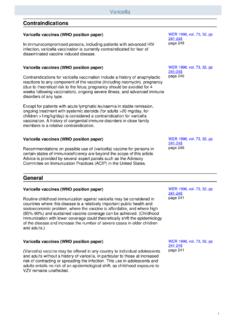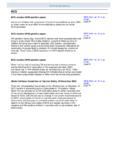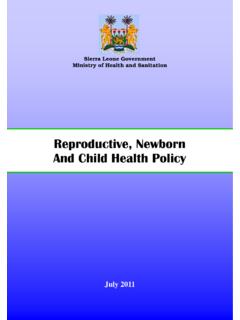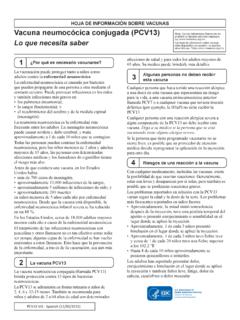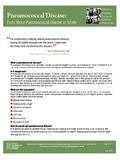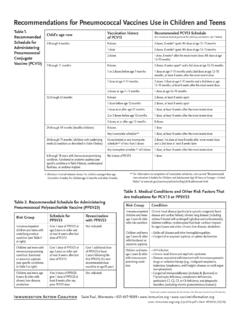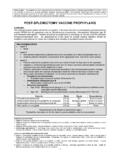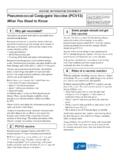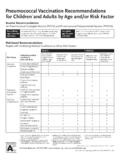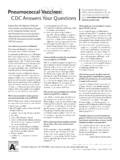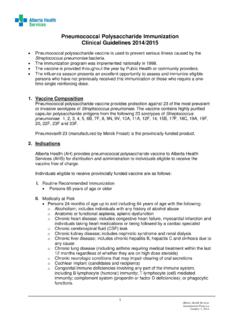Transcription of Pneumococcal Contraindications - World Health Organization
1 Contraindications Pneumococcal vaccines (WHO position paper) There are no absolute Contraindications to vaccination with Pneumococcal polysaccharide vaccine except for an anaphylactic reaction to the previous 2003, vol. 78, 14, pp 110-119 page 116 Pneumococcal conjugate vaccine for childhood immunization (WHO position paper) The only contraindication to PCV-7 immunization is a severe hypersensitivity reaction to a previous dose of the 2006, vol. 82, 10, pp 93-104 page 102 General Pneumococcal vaccines (WHO position paper) (P)oor immunogenicity of polysaccharide ( Pneumococcal ) vaccines in early childhood precludes the use of the 23-valent Pneumococcal vaccine in the high-risk group of children under 2 years of 2003, vol.
2 78, 14, pp 110-119 page 111 Pneumococcal vaccines (WHO position paper) The duration of protection following immunization with the 23-valent polysaccharide vaccine is estimated at 5 years, or more, in healthy adults. However, the duration may be considerably shorter in some high-risk groups for Pneumococcal disease. Revaccination using the polysaccharide vaccine is not routinely recommended. (Page 116) Revaccination using the polysaccharide vaccine is not routinely recommended, but immunocompromised children who have received polysaccharide vaccine may be revaccinated after 3 years. The safety of three or more doses of the polysaccharide vaccine is not 2003, vol.
3 78, 14, pp 110-119 page 112 Pneumococcal vaccines (WHO position paper) A single dose of the 23-valent polysaccharide vaccine is recommended for selected groups above 2 years of age at increased risk of Pneumococcal disease. These groups include the healthy elderly (over 65 years of age), particularly those living in 2003, vol. 78, 14, pp 110-119 page 116 Pneumococcal vaccines (WHO position paper) There are no absolute Contraindications to vaccination with Pneumococcal polysaccharide vaccine except for an anaphylactic reaction to the previous 2003, vol. 78, 14, pp 110-119 page 116 1 PneumococcalPneumococcal vaccines (WHO position paper) The polyvalent polysaccharide vaccine is recommended for selected groups above 2 years of age with increased risk of Pneumococcal disease.
4 Such groups include the healthy elderly (over 65 years old), particularly those living in institutions, patients suffering from chronic organ failure, diabetes, nephrotic syndrome and certain immunodeficiencies, particularly those with functional or anatomical asplenia. Recent meta-analyses on the efficacy and effectiveness of the Pneumococcal polysaccharide vaccine have raised doubts about the benefit of the vaccine in the elderly population. However, these vaccines continue to be recommended for this group based on evidence from observational studies that show a beneficial effect against Pneumococcal disease associated with 2003, vol.
5 78, 14, pp 110-119 page 118 Conclusions and recommendations from the Strategic Advisory Group of Experts (SAGE) - 9-11 November 2005 SAGE recommended that WHO gives a clear signal on the priority for wider use of Pneumococcal vaccine in children. Lack of clarity of demand is a critical factor inhibiting industrial scaling up of manufacturing capacity. This uncertainty needs to be overcome since validated demand forecasts are essential for the commitments required from industry that will make this vaccine available at affordable prices. In particular, evidence was required through studies on disease burden of the cost benefit of using Pneumococcal conjugate vaccines and the feasibility of vaccine delivery to all vulnerable groups.
6 Pneumococcal serotype prevalence studies, undertaken in different settings, are required to judge the appropriateness of the conjugate vaccine to be used. A firm position from SAGE will be required once serotype prevalence studies are completed to judge the appropriateness of the conjugate vaccine available. (SAGE) recognized that a global recommendation, made before resolution of funding and supply issues, could leave vulnerabilities that have been experienced with the implementation of Hib 2006, vol. 81, 1, pp 2-11 page 10 Pneumococcal vaccines (WHO position paper) Pneumococcal polysaccharide vaccine.
7 Does not tolerate freezing and should be stored at 2003, vol. 78, 14, pp 110-119 page 115 Temperature sensitivity of vaccines The only currently licensed Pneumococcal conjugate vaccine, a 7-valent vaccine produced by Wyeth, is formulated with aluminum adjuvant, is a liquid, and should be protected from freezing as for other aluminum adjuvanted vaccines. For long term storage it should be stored at page 21 2 PneumococcalState of the art of new vaccines: research and development The polyvalent PS (polysaccharide) vaccine (against Streptococcus pneumoniae) is recommended for healthy people over 65 years of age, particularly those living in institutions.
8 Randomized controlled trials in healthy elderly people in industrialized countries have, however, failed to show a beneficial effect of the vaccine, so that recommendation for its use in the elderly is based on data from observational studies showing a significant protective effect against invasive (bacteraemic) Pneumococcal disease, but not page 27 Conclusions and recommendations from the meeting of the immunization Strategic Advisory Group of Experts (SAGE) - November 2006 SAGE considers that including Pneumococcal conjugate vaccine in national immunization programmes should be a priority and supports the introduction of the currently licensed PCV-7 vaccine.
9 This recommendation is based on epidemiological data and vaccine-impact data from a number of different settings. Countries with mortality among children under the age of 5 years of >50 deaths/1000 births, or with >50 000 annual deaths among children, should make the introduction of PCV-7 a high priority for their immunization 2006, vol. 82, 1, pp 1-16 page 8 Conclusions and recommendations from the meeting of the immunization Strategic Advisory Group of Experts (SAGE) - November 2006 Countries are encouraged to conduct appropriate surveillance for Pneumococcal invasive disease in order to establish a baseline and to monitor the impact of vaccination, including the occurrence and magnitude of replacement 2006, vol.
10 82, 1, pp 1-16 page 9 Conclusions and recommendations from the meeting of the immunization Strategic Advisory Group of Experts (SAGE) - November 2006 The incidence of preventable disease (that is, the product of the proportion of severe disease caused by vaccine serotypes and the rate of Pneumococcal disease) should be used to anticipate the likely impact of Pneumococcal conjugate vaccine. Where country-specific estimates of the incidence of preventable Pneumococcal disease are not available, they may be approximated using data from epidemiologically similar 2006, vol. 82, 1, pp 1-16 page 9 3 PneumococcalConclusions and recommendations from the meeting of the immunization Strategic Advisory Group of Experts (SAGE) - November 2006 The burden of Pneumococcal disease is substantially higher among individuals infected with HIV.

